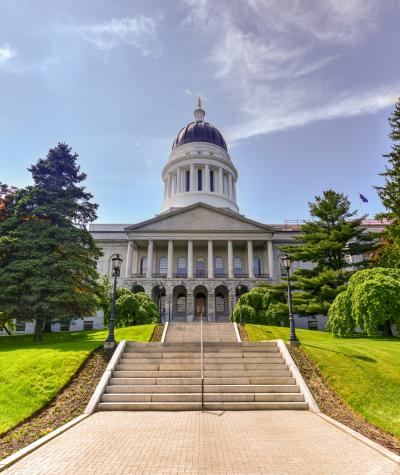Wealthy special interests use campaign money to influence voters and exert control over political decision-making at all levels of government.
The 1st Circuit Court of Appeals recently heard oral arguments in four consolidated cases regarding a new Maine law that addresses one particularly troubling form of influence: spending by foreign governments in state elections.
The U.S. Supreme Court has already recognized that Americans’ interest in democratic self-governance means that foreign nationals can be barred from spending money in U.S. elections. Now, the 1st Circuit Court has an opportunity to reaffirm this principle and ensure that Maine can shield its democratic institutions from foreign influence.
The appeal comes after the U.S. District Court for the District of Maine blocked enforcement of the entire law (known as Question 2). Campaign Legal Center (CLC) is representing Protect Maine Elections, the ballot measure committee that was founded to help draft and enact Question 2, in defending the law.
The law bans election spending by foreign governments or corporations in which a foreign government has an ownership share of more than 5%. The law also provides for disclosure, requiring foreign government-influenced corporations to include a brief disclaimer identifying themselves on any public communications they make to lobby state or local officials.
An overwhelming 86% of the Maine electorate voted to approve Question 2 on the 2023 ballot, aiming to stop the surge of foreign money that had already flooded past state elections.
Foreign spending in Maine’s elections is a recurring issue. In 2020, a public utility owned by Quebec’s government spent $20 million and a corporation substantially owned by a Qatar government sovereign fund spent $7.5 million to influence a local initiative. In 2023, a corporation owned by the City of Calgary, Canada contributed over $15 million to another initiative.
Weeks after voters passed Question 2 to help curb foreign spending in elections, four different sets of plaintiffs filed four different lawsuits challenging the constitutionality of the law.
In defending the law in the district court, Protect Maine Elections pointed out that the Supreme Court has already affirmed that U.S. voters have good reason to “[limit] the participation of foreign citizens in activities of American democratic self-government.” The Supreme Court has also repeatedly held that political disclosure requirements protect citizens’ right to “make informed decisions” in the political arena and “give proper weight to different speakers and messages.”
Despite the strong constitutional basis for Question 2, the District Court took issue with a specific component of the law — its ban on spending by corporations where a foreign government owns 5% or more of the total company. The court, however, conceded that banning election spending by actual “foreign governments” was likely constitutional.
Nevertheless, the District Court issued a sweeping preliminary injunction barring any part of the law from being enforced while the case is litigated. It did not even discuss the disclosure requirement — a stand-alone provision — but that too is blocked by the order.
This broad injunction appears to contradict the court’s own legal analysis and wholly fails to protect Maine voters from foreign actors trying to influence their vote.
Now that Maine has appealed, the 1st Circuit is considering two questions: First, whether Maine can use 5% foreign ownership as a benchmark for when a corporation can be barred from participating in U.S. elections; and second, whether the lower court abused its discretion by failing to preserve the aspects of the law that it indicated were likely constitutional.
While Congress and federal agencies in charge of election integrity have neglected to close the gaps in campaign finance laws that foreign interests use to insert themselves in our democracy, local governments like Maine are stepping up to protect their citizens.


